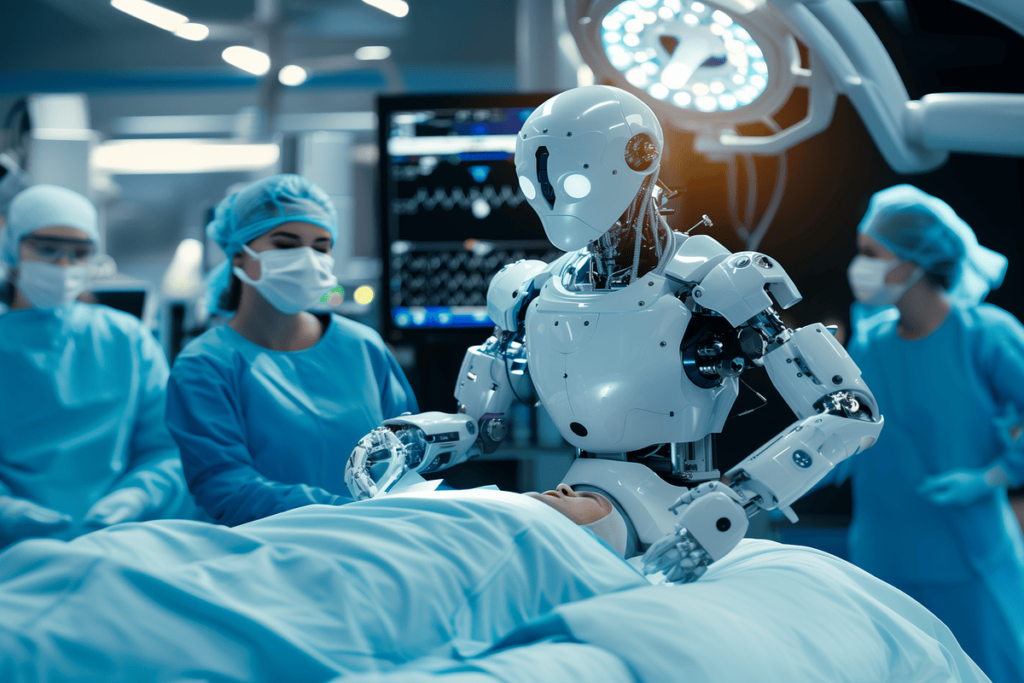With its revolutionary approaches to patient care, illness diagnosis, and treatment, artificial intelligence (AI) is drastically changing the healthcare sector. AI is improving diagnosis accuracy and expediting medical procedures by analyzing large volumes of medical data at breakneck speed. However, is AI merely a tool to assist human doctors, or can it actually replace them? This article investigates whether robots can replace doctors and how AI helps with disease diagnosis.
The AI Revolution in Medicine
Virtual assistants and chatbots driven by AI are improving patient interaction, and robotic surgery devices are making intricate procedures more precise. Even with its quick development, artificial intelligence is still a tool to supplement human knowledge, not to replace it. As AI develops further, its application in healthcare holds potential for increased patient accessibility, accuracy, and efficiency on a global scale. This article investigates whether robots can replace doctors and how AI helps with disease diagnosis.
How AI Helps in Disease Diagnosis
AI is proving to be a game-changer in medical diagnostics, providing faster and more accurate results compared to traditional methods. Here’s how AI is making a significant impact:
1. Enhancing Medical Imaging Analysis
Massive volumes of data are produced by medical imaging technologies, including CT, MRI, and X-rays. AI-powered tools, such as IBM Watson and Google’s DeepMind, are able to analyze these images with amazing accuracy and spot anomalies that human radiologists might miss. According to studies, artificial intelligence (AI) can identify ailments like neurological disorders, lung conditions, and breast cancer with accuracy rates that are on par with or even higher than those of human specialists.
2. Early Detection of Diseases
AI algorithms can identify early signs of diseases such as cancer, Alzheimer’s, and diabetes by analyzing patterns in patient data. Early diagnosis increases the chances of successful treatment and improves patient outcomes. For example, AI models trained on retinal scans can predict the risk of diabetic retinopathy, enabling early intervention and reducing vision loss.
3. Personalized Treatment Plans
Doctors can create individualized treatment plans based on a patient’s genetic composition, lifestyle, and medical history with the aid of AI-driven diagnostic technologies. AI can suggest customized treatments that improve therapy efficacy and reduce negative effects by evaluating large amounts of data. In oncology, where precision medicine is transforming cancer treatment, this strategy is very helpful.
4. AI in Pathology and Laboratory Testing
In order to diagnose diseases, pathologists examine tissue samples; however, by identifying microscopic patterns suggestive of diseases, AI-powered digital pathology tools can speed up this procedure. Infections and other medical diseases can be diagnosed more accurately and efficiently thanks to AI-assisted lab testing, which also lowers human error.
Can AI Replace Human Doctors?
While AI is making remarkable advancements, it is unlikely to completely replace human doctors. However, AI is transforming medical practice in the following ways:
1. AI as a Decision Support System
By offering recommendations based on evidence, AI helps physicians make better decisions. AI is a helpful tool that supports doctors in making better judgments, lowering diagnostic errors, and enhancing patient outcomes, rather than taking the place of doctors.
2. Robotic Surgery: Precision and Efficiency
Robotic devices powered by AI, like the da Vinci Surgical System, help surgeons carry out minimally invasive surgeries with unmatched accuracy. Although these robots are operated by human surgeons, they are more accurate at performing delicate procedures, which lowers surgical risks and speeds up recovery.
3. AI Chatbots and Virtual Health Assistants
Ada Health and Babylon Health are two examples of AI-powered chatbots and virtual assistants that are enhancing patient care by offering immediate medical advice based on symptoms. By managing common queries, these AI solutions ease the strain on healthcare systems and free up physicians to concentrate on more complex cases.
4. Ethical and Human Aspects of Medicine
Notwithstanding AI’s potential, human physicians provide traits like empathy, moral discernment, and individualized patient care that robots cannot match. AI is unable to fully understand the ethical and emotional intelligence involved in healthcare. Patients frequently look for compassion and reassurance, which can only be given by human healthcare professionals.
Challenges and Future Prospects of AI in Medicine
While AI holds great promise, several challenges must be addressed for its successful integration into healthcare:
Data Privacy and Security: Protecting patient data from cyber threats is crucial.
Regulatory and Ethical Issues: Clear guidelines are needed to regulate AI’s role in medical decision-making.
Integration with Existing Systems: Healthcare providers must ensure seamless integration of AI with traditional medical practices.
Bias and Accuracy: AI models must be trained on diverse datasets to avoid biases in diagnosis and treatment recommendations.
Conclusion: AI as an Ally, Not a Replacement
Unquestionably, artificial intelligence is changing the medical field by helping physicians make decisions, boosting surgical accuracy, and diagnosing diseases. However, rather than taking the role of human physicians, AI should be considered a potent tool. To maintain a balance between technology innovation and the invaluable human touch in patient care, AI and medical professionals working together is the key to the future of healthcare. AI holds promise for improving healthcare’s effectiveness, accessibility, and personalization as it develops further, which will benefit both patients and physicians.
Author : Ghandoumy Mostafa


